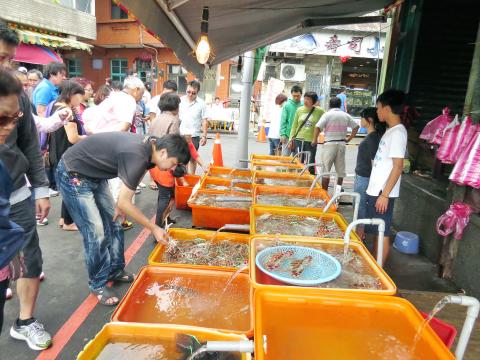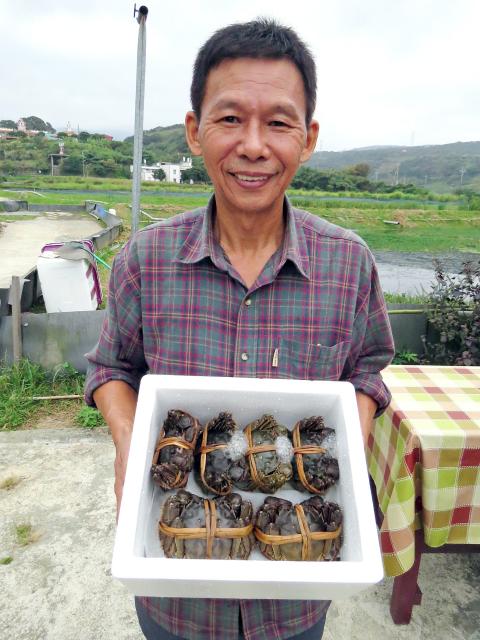As crab season has arrived in Taiwan, Lai Hui-lien (賴卉蓮), a physician at the Ministry of Health and Welfare’s Keelung Hospital, is urging members of the public to show restraint.
Crab meat is very rich in protein, which means it is not healthy to eat too much of it, Lai said, especially people who suffer from hypertension or cardiovascular diseases.
People with gout or skin allergies should avoid crab completely, she said.

Photo: Yu Chao-fu, Taipei Times
Deemed to be “cold” in terms of Chinese medicine, crabs should not be eaten alongside with beer and pears, Lai said.
Crab season coincides with persimmon season, but the two do not go together, as the protein in crab meat can coagulate with the tannin in persimmon and lead to indigestion, which can cause food in the intestines to ferment and lead to stomach pains and diarrhea, the doctor said.
It is not just consumers who look forward to crab season every year, the nation’s fishermen do too.

Photo: Yu Chao-fu, Taipei Times
Fishermen say that Taiwanese crabs fall into two categories: those born in captivity — mainly Chinese Mitten crabs — and wild crabs such as the stone crabs found off New Taipei City’s Wanli District (萬里).
Wanli is one of the top four ports nationwide for crab cuisine — a distinction it shares with the city’s Yehliu (野柳) and Gueihung (龜吼) districts and Dongao (東澳) in Yilan County.
However, the popularity of crabs in Wanli has led to a significant hike in prices.
Local business operator Lu Feng-e (呂鳳娥) said crabs and crab dishes in Wanli are now a lot more expensive than they are in Keelung, about a half-hour drive away.
His advice to customers it to try to select fresh crabs by observing their “liveliness.”
Chiang Ching-shu (江慶樹) owns the Chingshan Chinese Mitten Crab farm in New Taipei City’s Shihmen District (石門) and he said the quality of crabs bred at his farm are the result of a lot of work and top quality feed.
There are seven ponds on his farm, spread across 3,000 ping (9,917.37m2) of land and filled with mountain water from Yangmingshan (陽明山), he said. His crabs are fed mackerel, corn, wheat and silver-stripe round herring for 10 months, but no antibacterial medicines or growth hormones are used.
The farm sends a sample of its crabs to the SGS Co and the New Taipei City Department of Agriculture for inspection before sales commence each year, Chiang said.
The meat from male Chinese mitten crabs is more tender, while the females allow gourmands to enjoy both the meat and eggs, Chiang said.
If consumers want to pick up the freshest crabs, they should look for bubbles in the water, and buy from local vendors, he said.
The going prices are: for six crabs totaling 1kg, NT$2,000; five crabs totaling 1kg, NT2,400 and four crabs totaling 1kg,NT$2,800, Chiang said.

A preclearance service to facilitate entry for people traveling to select airports in Japan would be available from Thursday next week to Feb. 25 at Taiwan Taoyuan International Airport, Taoyuan International Airport Corp (TIAC) said on Tuesday. The service was first made available to Taiwanese travelers throughout the winter vacation of 2024 and during the Lunar New Year holiday. In addition to flights to the Japanese cities of Hakodate, Asahikawa, Akita, Sendai, Niigata, Okayama, Takamatsu, Kumamoto and Kagoshima, the service would be available to travelers to Kobe and Oita. The service can be accessed by passengers of 15 flight routes operated by

Chinese spouse and influencer Guan Guan’s (關關) residency permit has been revoked for repeatedly posting pro-China videos that threaten national security, the National Immigration Agency confirmed today. Guan Guan has said many controversial statements in her videos posted to Douyin (抖音), including “the red flag will soon be painted all over Taiwan” and “Taiwan is an inseparable part of China,” and expressing hope for expedited reunification. The agency last year received multiple reports alleging that Guan Guan had advocated for armed reunification. After verifying the reports, the agency last month issued a notice requiring her to appear and explain her actions. Guan

GIVE AND TAKE: Blood demand continues to rise each year, while fewer young donors are available due to the nation’s falling birthrate, a doctor said Blood donors can redeem points earned from donations to obtain limited edition Formosan black bear travel mugs, the Kaohsiung Blood Center said yesterday, as it announced a goal of stocking 20,000 units of blood prior to the Lunar New Year. The last month of the lunar year is National Blood Donation Month, when local centers seek to stockpile blood for use during the Lunar New Year holiday. The blood demand in southern Taiwan — including Tainan and Kaohsiung, as well as Chiayi, Pingtung, Penghu and Taitung counties — is about 2,000 units per day, the center said. The donation campaign aims to boost

The Central Weather Administration (CWA) said a magnitude 4.9 earthquake that struck off the coast of eastern Taiwan yesterday was an independent event and part of a stress-adjustment process. The earthquake occurred at 4:47pm, with its epicenter at sea about 45.4km south of Yilan County Hall at a depth of 5.9km, the CWA said. The quake's intensity, which gauges the actual effects of a temblor, was highest in several townships in Yilan and neighboring Hualien County, where it measured 4 on Taiwan's seven-tier intensity scale, the CWA said. Lin Po-yu (林柏佑), a division chief at the CWA's Seismological Center, told a news conference